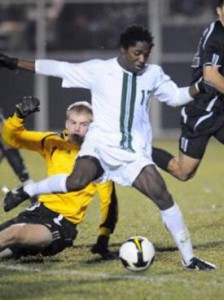By Mene Ukueberuwa
The Dartmouth men’s soccer season came to a close in a heartbreaking manner typical of many recent Dartmouth athletic programs after a 2-1 loss to the Bruins of UCLA in the final minutes of overtime on Sunday, November 28. In spite of its unsavory end however, the overall season will be recalled by both the team and its supporters as an exceptional success, as Dartmouth claimed third place in the Ivy League with a 4-3 conference record, and reached the Round of 16 in the NCAA tournament as an unseeded team for the second time in the past four years before their unfortunate defeat at the hands of the 8th-seeded Bruins.
Dartmouth’s Lucky Mkosana was named earlier in the season to a watchlist for the Hermann Trophy, collegiate soccer’s Heisman.
The team’s success did not come as a surprise to Jeff Cook, its head coach of ten years who noted the gradual progress the program had made during his tenure. “We knew we had the talent and experience to compete for an NCAA championship,” he recalled describing the optimism present amongst him and his players prior to the season.
According to Cook, the high expectations the team placed on itself, drawn from the desire to build upon the modest success of the Dartmouth 3-4 2009 season, initially may have worked against the team as they fell to a .500 record after a tormenting 1-0 loss to the University of Pennsylvania on a single early goal followed by another defeat at the hands of Boston College on a goal given up in the game’s final minutes.
“[The Homecoming victory against Harvard] was undoubtedly the turning point for us,” said Cook of Dartmouth’ 2-1 win that laid the foundation for their consequential victories against the University of New Hampshire, Cornell University, and Brown University, and their march to the third round of the NCAA tournament. Cook gratefully credited the “determination and strength of the team” for the recovery, as well as a prominent shift in the team’s playing strategy. “The key was our defensive improvements,” he described recounting the restructuring efforts the team underwent after the loss to Boston College. Abandoning the aggressive offensive press in favor of a deeper defense helped to “prevent soft goals, and also created space for counterattack” that enabled Dartmouth to play with the confidence and stability necessary to compete with the powerful offenses of their opponents.
As the team began to accumulate success, the excitement and support of the Dartmouth community grew in kind. “We are so appreciative of the fan support; it really made a difference, particularly to the student athletes,” Cook noted, describing how the spirit of the supporters had a particular, palpable impact during the Dartmouth’s victory in their regular season closer against Brown University, as the energy levels of the coach, players, and fans had all risen to a simultaneous summit. “[The Dartmouth fan-base], and the entire culture over at Burnham Field, have really grown consistently,” he appreciatively recalled of the deepening connection between the program and the campus community.
Just as they were able to surpass the benchmarks set during the 2009 season in 2010, Dartmouth looks forward to exceeding rather than replicating the successes of their most recent season in 2011. “Our return to the Sweet Sixteen was the second trip for the seniors, who have also had an Ivy title,” Cook mentioned as part of his assertion that the team had become nationally competitive in recent years. As he and the team look forward to applying the lessons gathered from the highs and lows of the season and tournament to the following year, they face the challenge posed by dealing with the loss of the seven members of the Class of 2011 and two of the Class of 2010 who played their final games for Dartmouth in the 2010 season.
According to Cook, the two members of the Class of 2010, Donnie Surdoval and Daniel Keat, able to remain with the team because of time lost to injuries during earlier seasons, made a particular impact as “redshirting” (the delaying of an athlete’s participation for the purpose of lengthening his or her period of playing eligibility) is prohibited in Ivy League athletics. Cook is very confident, however, that the remaining team members have the talent and drive to step up and fill the void created by the graduating class, and continue Dartmouth’s quickening march toward national prominence.
The goal scored by UCLA with eight seconds remaining in the second overtime period of Dartmouth’s Round of 16 match undoubtedly drew a painful end to a season that far surpassed expectations and stirred he emotions of the players and their many supporters. However, in keeping with his overall optimistic attitude toward the program, Cook draws considerable pride from the notion of even being in the position of feeling disappointed after a season marked by a winning conference record and two exceptional victories in the national tournament. “There’s often a bit of an inferiority complex that develops with these smaller schools, and it’s good to know that we can play with a Notre Dame or UCLA,” he described of the confidence that the team has come away with after a bit of time to digest their defeat.
“I’m proud of how the team represented Dartmouth,” he concluded, evoking the feeling that Dartmouth athletics have tangible impact on the image of the Dartmouth as a whole, and that the success of Dartmouth men’s soccer has brought much needed and much appreciated honor to the College.


Be the first to comment on "Coach Cook Reflects on Dartmouth Soccer"